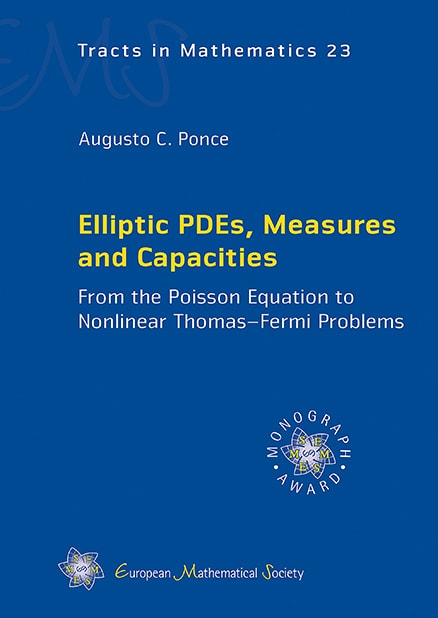Elliptic PDEs, Measures and Capacities
From the Poisson Equation to Nonlinear Thomas–Fermi Problems
Augusto C. Ponce
Université catholique de Louvain, Belgium

A subscription is required to access this book.
Winner of the 2014 EMS Monograph Award!
Partial differential equations (PDEs) and geometric measure theory (GMT) are branches of analysis whose connections are usually not emphasized in introductory graduate courses. Yet, one cannot dissociate the notions of mass or electric charge, naturally described in terms of measures, from the physical potential they generate. Having such a principle in mind, this book illustrates the beautiful interplay between tools from PDEs and GMT in a simple and elegant way by investigating properties like existence and regularity of solutions of linear and nonlinear elliptic PDEs.
Inspired by a variety of sources, from the pioneer balayage scheme of Poincaré to more recent results related to the Thomas–Fermi and the Chern–Simons models, the problems covered in this book follow an original presentation, intended to emphasize the main ideas in the proofs. Classical techniques like regularity theory, maximum principles and the method of sub- and supersolutions are adapted to the setting where merely integrability or density assumptions on the data are available. The distinguished role played by capacities and precise representatives is also explained. Other special features are:
• the remarkable equivalence between Sobolev capacities and Hausdorff contents in terms of trace inequalities;
• the strong approximation of measures in terms of capacities or densities, normally absent from GMT books;
• the rescue of the strong maximum principle for the Schrödinger operator involving singular potentials.
This book invites the reader to a trip through modern techniques in the frontier of elliptic PDEs and GMT, and is addressed to graduate students and researchers having some deep interest in analysis. Most of the chapters can be read independently, and only basic knowledge of measure theory, functional analysis and Sobolev spaces is required.